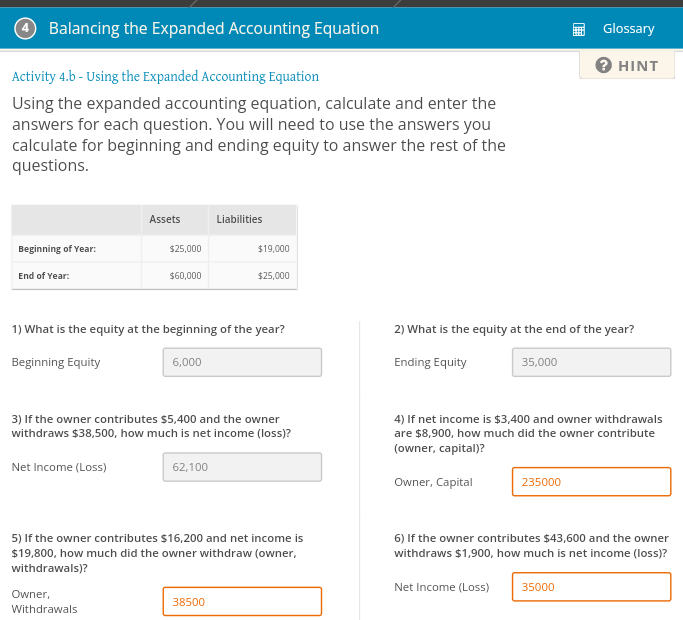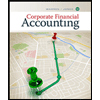Balancing the Expanded Accounting Equation Activity 4.b - Using the Expanded Accounting Equation Using the expanded accounting equation, calculate and enter the answers for each question. You will need to use the answers you calculate for beginning and ending equity to answer the rest of the questions. Beginning of Year: End of Year: Assets $25,000 $60,000 Owner, Withdrawals 1) What is the equity at the beginning of the year? Beginning Equity 6,000 Liabilities 3) If the owner contributes $5,400 and the owner withdraws $38,500, how much is net income (loss)? Net Income (Loss) 62,100 $19,000 $25,000 5) If the owner contributes $16,200 and net income is $19,800, how much did the owner withdraw (owner, withdrawals)? 38500 2) What is the equity at the end of the year? Ending Equity 35,000 Glossary → HINT 4) If net income is $3,400 and owner withdrawals are $8,900, how much did the owner contribute (owner, capital)? Owner, Capital 235000 6) If the owner contributes $43,600 and the owner withdraws $1,900, how much is net income (loss)? Net Income (Loss) 35000
Balancing the Expanded Accounting Equation Activity 4.b - Using the Expanded Accounting Equation Using the expanded accounting equation, calculate and enter the answers for each question. You will need to use the answers you calculate for beginning and ending equity to answer the rest of the questions. Beginning of Year: End of Year: Assets $25,000 $60,000 Owner, Withdrawals 1) What is the equity at the beginning of the year? Beginning Equity 6,000 Liabilities 3) If the owner contributes $5,400 and the owner withdraws $38,500, how much is net income (loss)? Net Income (Loss) 62,100 $19,000 $25,000 5) If the owner contributes $16,200 and net income is $19,800, how much did the owner withdraw (owner, withdrawals)? 38500 2) What is the equity at the end of the year? Ending Equity 35,000 Glossary → HINT 4) If net income is $3,400 and owner withdrawals are $8,900, how much did the owner contribute (owner, capital)? Owner, Capital 235000 6) If the owner contributes $43,600 and the owner withdraws $1,900, how much is net income (loss)? Net Income (Loss) 35000
Corporate Financial Accounting
14th Edition
ISBN:9781305653535
Author:Carl Warren, James M. Reeve, Jonathan Duchac
Publisher:Carl Warren, James M. Reeve, Jonathan Duchac
Chapter1: Introduction To Accounting And Business
Section: Chapter Questions
Problem 1.2BE
Related questions
Question
) If net income is $3,400 and owner withdrawals are $8,900, how much did the owner contribute (owner, capital)?
Owner, Capital
5) If the owner contributes $16,200 and net income is $19,800, how much did the owner withdraw (owner, withdrawals)?
Owner, Withdrawals
6) If the owner contributes $43,600 and the owner withdraws $1,900, how much is net income (loss)?
Net Income (Loss)

Transcribed Image Text:44 Balancing the Expanded Accounting Equation
Activity 4.b - Using the Expanded Accounting Equation
Using the expanded accounting equation, calculate and enter the
answers for each question. You will need to use the answers you
calculate for beginning and ending equity to answer the rest of the
questions.
Beginning of Year:
End of Year:
Assets
$25,000
$60,000
Owner,
Withdrawals
6,000
1) What is the equity at the beginning of the year?
Beginning Equity
Liabilities
62,100
$19,000
3) If the owner contributes $5,400 and the owner
withdraws $38,500, how much is net income (loss)?
Net Income (Loss)
$25,000
38500
5) If the owner contributes $16,200 and net income is
$19,800, how much did the owner withdraw (owner,
withdrawals)?
2) What is the equity at the end of the year?
Ending Equity
35,000
Glossary
? HINT
4) If net income is $3,400 and owner withdrawals
are $8,900, how much did the owner contribute
(owner, capital)?
Owner, Capital
235000
6) If the owner contributes $43,600 and the owner
withdraws $1,900, how much is net income (loss)?
Net Income (Loss) 35000
Expert Solution
This question has been solved!
Explore an expertly crafted, step-by-step solution for a thorough understanding of key concepts.
This is a popular solution!
Trending now
This is a popular solution!
Step by step
Solved in 4 steps

Knowledge Booster
Learn more about
Need a deep-dive on the concept behind this application? Look no further. Learn more about this topic, accounting and related others by exploring similar questions and additional content below.Recommended textbooks for you

Corporate Financial Accounting
Accounting
ISBN:
9781305653535
Author:
Carl Warren, James M. Reeve, Jonathan Duchac
Publisher:
Cengage Learning

Accounting (Text Only)
Accounting
ISBN:
9781285743615
Author:
Carl Warren, James M. Reeve, Jonathan Duchac
Publisher:
Cengage Learning

Cornerstones of Financial Accounting
Accounting
ISBN:
9781337690881
Author:
Jay Rich, Jeff Jones
Publisher:
Cengage Learning

Corporate Financial Accounting
Accounting
ISBN:
9781305653535
Author:
Carl Warren, James M. Reeve, Jonathan Duchac
Publisher:
Cengage Learning

Accounting (Text Only)
Accounting
ISBN:
9781285743615
Author:
Carl Warren, James M. Reeve, Jonathan Duchac
Publisher:
Cengage Learning

Cornerstones of Financial Accounting
Accounting
ISBN:
9781337690881
Author:
Jay Rich, Jeff Jones
Publisher:
Cengage Learning

Financial Accounting: The Impact on Decision Make…
Accounting
ISBN:
9781305654174
Author:
Gary A. Porter, Curtis L. Norton
Publisher:
Cengage Learning


Corporate Financial Accounting
Accounting
ISBN:
9781337398169
Author:
Carl Warren, Jeff Jones
Publisher:
Cengage Learning